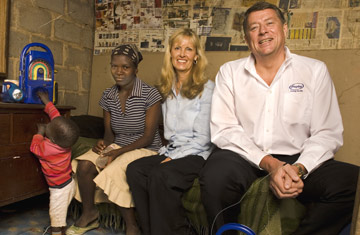
Millions of Africans live without electricity, forced to make do instead with kerosene and firewood — sources of energy that wreak havoc on the environment. Likewise, struggling farmers, refugees and child-headed households often depend on radio broadcasts as a vital source of information and education — yet radio batteries are not only expensive but toxic when disposed of improperly. "It all comes back to the problem of power. There is huge energy poverty in the world, and that energy poverty causes more pollution," says Rory Stear, founder of Freeplay Energy, a -London-based company that makes hand-powered radios, lanterns, flashlights and portable generators — ingeniously simple products that provide affordable energy anywhere without requiring disposable batteries.
Stear, a gregarious 6-ft.-7-in. (2 m) South African, oversees the 12-year-old company. Meanwhile, his American wife, Kristine Pearson, directs the independently run Freeplay Foundation, a charity that works with agencies like UNICEF and CARE to distribute these products to those who need them most but can afford them least. Pearson, a fearless traveler, spends much of her time visiting refugee camps and AIDS orphans, figuring out what kinds of designs will really help them; her encounters with orphans in Rwanda, for example, led to the development of a bright blue radio that's virtually indestructible and thus ideal for child-headed households. The foundation has distributed 150,000 radios in the past four years, and is currently delivering another 80,000 to southern Sudan.
"Renewable energy is absolutely central to the growth of the continent," says Pearson. "And access to information is key for people to make better choices and improve the quality of their lives." The children simply wind a handle on the radio, and a bespoke alternator converts their energy into electricity. By tuning in, these isolated kids gain access to educational programs, as well as information about farming, health and raising siblings. According to Pearson, "Children say that the voice they trust is the voice of the radio."
With its array of products tailor-made for the poor, the commercial side of Freeplay is expanding in Africa, India and beyond. It's a powerful reminder that, in the hands of social entrepreneurs, corporations can do a lot of good while also turning a decent profit. "Business has to have a conscience," says Stear, but shareholders have to do well, too. In a world where the energy needs of the poor might otherwise be ignored, this happy marriage of pragmatism and idealism is itself a beacon of light.